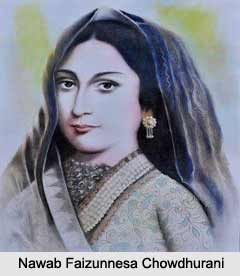 Nawab Faizunnesa Chowdhurani was a prolific Muslim writer and a social welfare activist. She was a rich Zamindar and followed all the tenets of Islam. She received no formal education. She studied in her library during her leisure time. . She was proficient in Arabic, Persian, Sanskrit and Bengali languages. She learned at a time when the superstitious belief existed that women would go to hell if they were given education but she was aware of the fact that a nation would never advance without modern education. She believed that a nation would prosper only if both men and women were educated. So with her own funds she established eleven primary schools in her own Zamindari.
Nawab Faizunnesa Chowdhurani was a prolific Muslim writer and a social welfare activist. She was a rich Zamindar and followed all the tenets of Islam. She received no formal education. She studied in her library during her leisure time. . She was proficient in Arabic, Persian, Sanskrit and Bengali languages. She learned at a time when the superstitious belief existed that women would go to hell if they were given education but she was aware of the fact that a nation would never advance without modern education. She believed that a nation would prosper only if both men and women were educated. So with her own funds she established eleven primary schools in her own Zamindari.
Nawab Fanzines Choudhurani was born in 1834 at Paschim Gaon in Tripura. She was the daughter of Ahmed Ali Choudhury, who was the sixth descendent of Amir Agan Khan and Arafannesa Chowdhurani. She was born into a rich aristocratic Zamindari family. When she was an infant she lost her father. She was not sent to school but was educated by a private tutor. Her married life was not a success. She obtained a divorce and returned to her father`s home. Her proper education started only after becoming a mother.
One of her famous literary work is Rupjalal, written in Bengali. This was the fourth book written by any Bengali woman writer. Another important work is Tattva 0 Jatiya, Sangeet - a book of Bengali poems that deals with religion and politics. Besides, she wrote two other books of poems in Bengali, Sangeetsar and "Sangeetlahari".
Overcoming many difficulties she laid the foundations of the traditional Sanskrit school, JOLE. In her village she started a free Madarassa known as `Faizunnesa Government Degree College" and also a Middle English School in Comilla town. She started a Madarassa even at Mecca. She was the member of `Salehi Samiti` of the Tagore family at Calcutta.
Faizunnesa was not only confined to the literary field but also to social welfare activities. She established a charitable hospital at Laksham and founded a hospital for women at Comilla. Her primary concern was the welfare of human beings irrespective of gender and faith. She did not undertake any welfare activities exclusively for Muslim women except that of paying the hostel fees of Muslim girl students to pursue their education without difficulty. She donated funds for the digging of ponds and improvement of roads.
Faizunnesa was honored with the title `Nawab` as a reward for her noble deeds. Before her death she donated her entire property to the nation. She died in 1903.




















